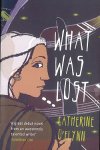Review:

 Tindal Street Press 2007
Tindal Street Press 2007
(Age 16+) Highly Recommended. If you're looking for something to tempt A-Level students into wider reading this could be just the book. I bought it on the strength of Jonathan Coe's on cover recommendation and I'm so glad I did. Catherine O'Flynn's novel, winner of Costa's First Novel prize, is both a highly readable detective story and a biting attack on our consumer obsessed society. I can certainly foresee a lively debate among students asked to discuss the parallels between Orwell's 1984 and What Was Lost.
Moving between the past and the present, What Was Lost focuses on the 1984 disappearance of ten year old Kate Meaney. Twenty years on her toy monkey is discovered at the Green Oaks shopping centre and the mystery of her disappearance is finally about to be solved.
This is a novel brimming with flawed characters - Green Oaks security guard, Kurt is haunted by a choice he made as a teenager with consequences that still reverberate twenty years on. Lisa, hapless manager of a record shop, is trapped in a miserable relationship and a job she hates. Adrian, accused of being linked to Kate's disappearance, is rootless and drifting. Teresa, Kate's erratic and dangerous friend, is fighting against the society that has failed her; and then there is Kate, fragile, brave and determined to be the best private detective since Philip Marlowe.
However, this novel is far more than the sum of its characters. O'Flynn has much to say on the creeping sickness of a society obsessed with the consumer dream; a society where shopping centres are the venue for Sunday worship and where retail mania is played out among shop workers' passive aggression. In Green Oaks you can glide along marbled atriums oblivious to what goes on behind the scenes - the twilight zone of service tunnels, stockrooms where minor battles rage and security cameras that are watched by guards who can see the rats as well as the people. In Green Oaks you are under the surveillance of a thousand cameras, surrounded by hordes of people and yet still experience the desolation of feeling entirely alone.
O'Flynn explores many themes - isolation, loneliness, loss and ultimately redemption. Occasional flashes of humour are on the manic side of funny, but this is primarily a haunting novel, probing and unsettling, that stays with you long after you've finished it.
Claire Larson
Home
What was lost by Catherine O'Flynn

 Tindal Street Press 2007
Tindal Street Press 2007 (Age 16+) Highly Recommended. If you're looking for something to tempt A-Level students into wider reading this could be just the book. I bought it on the strength of Jonathan Coe's on cover recommendation and I'm so glad I did. Catherine O'Flynn's novel, winner of Costa's First Novel prize, is both a highly readable detective story and a biting attack on our consumer obsessed society. I can certainly foresee a lively debate among students asked to discuss the parallels between Orwell's 1984 and What Was Lost.
Moving between the past and the present, What Was Lost focuses on the 1984 disappearance of ten year old Kate Meaney. Twenty years on her toy monkey is discovered at the Green Oaks shopping centre and the mystery of her disappearance is finally about to be solved.
This is a novel brimming with flawed characters - Green Oaks security guard, Kurt is haunted by a choice he made as a teenager with consequences that still reverberate twenty years on. Lisa, hapless manager of a record shop, is trapped in a miserable relationship and a job she hates. Adrian, accused of being linked to Kate's disappearance, is rootless and drifting. Teresa, Kate's erratic and dangerous friend, is fighting against the society that has failed her; and then there is Kate, fragile, brave and determined to be the best private detective since Philip Marlowe.
However, this novel is far more than the sum of its characters. O'Flynn has much to say on the creeping sickness of a society obsessed with the consumer dream; a society where shopping centres are the venue for Sunday worship and where retail mania is played out among shop workers' passive aggression. In Green Oaks you can glide along marbled atriums oblivious to what goes on behind the scenes - the twilight zone of service tunnels, stockrooms where minor battles rage and security cameras that are watched by guards who can see the rats as well as the people. In Green Oaks you are under the surveillance of a thousand cameras, surrounded by hordes of people and yet still experience the desolation of feeling entirely alone.
O'Flynn explores many themes - isolation, loneliness, loss and ultimately redemption. Occasional flashes of humour are on the manic side of funny, but this is primarily a haunting novel, probing and unsettling, that stays with you long after you've finished it.
Claire Larson
Home
© Pledger
Consulting, 2007